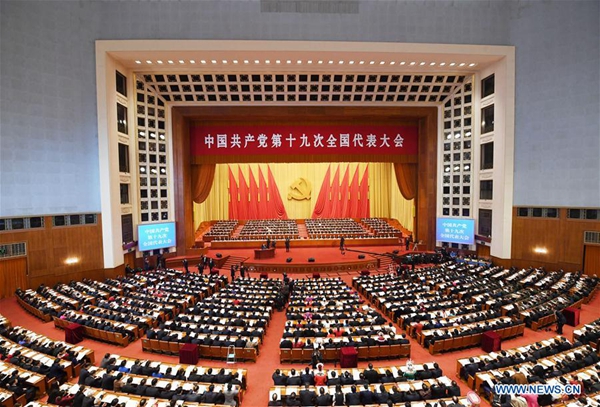China's new challenges a success of Xi's policies
- By George N. Tzogopoulos
 0 Comment(s)
0 Comment(s) Print
Print E-mail China.org.cn, November 4, 2017
E-mail China.org.cn, November 4, 2017
 |
|
The Communist Party of China (CPC) opens the 19th National Congress at the Great Hall of the People in Beijing, capital of China, Oct. 18, 2017. (Xinhua/Zhang Duo) |
The 19th National Congress of CPC was perhaps one of the most important such events in China's modern history. While the leadership of General Secretary Xi Jinping is unquestionable and was endorsed during this event, current economic choices will define living conditions for generations to come.
Although China is still a developing country with a nagging poverty problem – although Xi has pledged to soon eradicate it drawing on the remarkable progress of the last five years – the so-called "New Normal" deserves special attention as its impact will extend long-term.
China is successfully changing its growth model. The goal is to rely more on domestic investments and consumption than on exports. This approach is protecting the country against new crises, which might lead to reduced overseas demand for Chinese products, and motivating advancement of domestic technology and innovation.
In that regard, three main priorities are emerging. The first is to inspire confidence that the growth model can provide stable economic growth of between six and seven percent a year. The second is to combine the “New Normal” with environmental protection. And the third is to find new employment means for citizens because the development of technology and innovation could limit traditional jobs.
China’s characteristic governance style was played out during the National Congress. It differs from the Western political model, and policies cannot be fully interpreted if this is not understood.
Xi is bringing the country’s elite closer to general society by eliminating corruption at the highest level in order to set a good example of honest behavior. The Party chief shows no tolerance in that regard. Officials and businessmen caught for maladministration are now paying the price, and this fight will continue.
At the international level, China is gradually becoming a superpower. Its economic role goes beyond trade and business deals with foreign countries. China’s activities are now a powerful engine for international growth and the implementation of the Belt and Road Initiative displays this new reality.
Numerous investments are being carried out, consortia are being put together, job opportunities are being created, infrastructure is being improved and interconnectivity is being enhanced. More opportunities should emerge as long as the Belt and Road Initiative reaches additional regions and transcends the limits of the ancient Silk Road whose image it seeks to invoke.
Being an economic colossus, China is taking careful steps to provide benefits at the political level. Its contribution to UN missions, its strong voice in other international organizations, its mediation capacity in dealing with world problems and its leading presence in such entities as the SCO and the BRICS are changing its status.
Five years ago, China was a global player in the making. Now, it is an established giant in the international arena. While the Trump presidency in the U.S. is causing uncertainty, China is showing continuity in its policies and seeks to act with responsibility on critical issues such as the Paris climate agreement and the Iran nuclear accord. Even in globalization, it is actively supporting the process now being rejected in Washington.
China is making efforts to persuade the international community that its vision for the future is commensurate with peace and prosperity. Nonetheless, the West is looking at it suspiciously. For many Western politicians and analysts, China is not a a partner but a competitor, if not outright adversary.
They criticize it for the North Korea imbroglio, for tensions in South China Sea and for some trade practices, and they connect the Belt and Road Initiative with alleged hegemonic aspirations globally. In the next five years, more pressure will be exerted by Western countries on Beijing. The latter will need to further expand its cooperation model, explaining its “win-win” nature.
In a nutshell, the 19th CPC National Congress found China in different shape and standing in comparison to the period of the 18th. Progress and development are obvious. But progress and development are naturally bringing new challenges requiring wise and patient steering in the "New Era."
The success of Xi's governance is represented in the genesis of these challenges. The more China is growing, the more difficult the policy dilemmas will be, both domestically and internationally. Xi's second term gives him time to address them and complement his already positive record.
George N. Tzogopoulos is a columnist with China.org.cn. For more information please visit:
http://www.china.org.cn/opinion/GeorgeNTzogopoulos.htm
Opinion articles reflect the views of their authors, not necessarily those of China.org.cn.






Go to Forum >>0 Comment(s)